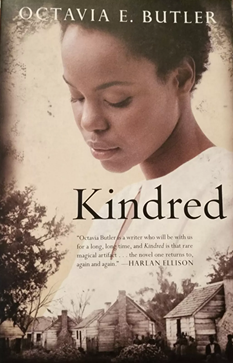
Prior to reading “Kindred” I had never before read a novel by Octavia E. Butler. Through the helpful world of social media I discovered the book on TikTok as someone was recommending the book on their page. After reading the novel I realize how heart-wrenching, thought-provoking, and deep the essence of the book carries. This is a book that deserves every ounce of recognition it has received and more.
Kindred is a novel about a woman named Dana who turns freshly twenty-six, while moving into her new house in California with her husband Kevin. However, strange occurrences begin to happen to Dana as she is transported back to the antebellum South to Maryland in the year 1815. As Dana continues to time travel back and forth between her present era of 1976 and the past she uncovers her purpose. She realizes the son of the plantation owner is her relative and she must help him escape death time and time again in order to protect her own future.
This book left me with a swarm of emotions from beginning to end; from anger, pain, anxiousness, helplessness, educated, and a million more. Despite the short length of the book, Butler takes the reader on an emotional journey as she details the truth and realities of life as a slave living on a plantation. Throughout the novel the inhumane tragedies that black people had to endure were not sugar coated but were illustrated with a painful reminder of the cruelty they had to endure. Butler does a superb job at giving you a glimpse of the daily horrors of slaves while simultaneously leaving you cognizant that this book only encapsulates a small portion of the lives of slaves and no one will ever truly resonate and understand the issues of the time.
While reading I came to a greater understanding how overtime it is easy for a person to unconsciously fall into the mindset of a slave. While Dana is from 1976 and enjoys freedom and the privileges of interracial marriage as she is transported back to 1815 Maryland time and time again and lives the life of an African American slave the reader witnesses how natural it is for her to fall back into this “routine”. In her novel Butler once again does a good job at portraying how a person can bend towards submission and compliance when they answer to the power of another person that holds their lives in their hands. At one point during the novel while Dana is stuck on the plantation she realizes “kevin and [herself] became more a part of the household, familiar, accepted, accepting” (97). Again, Butler reveals the scary psychological grasp that slavery could take of any person.
This is a book that was ahead of its time and will always be both a prevalent and important read no matter who you are. The weight of the book endures throughout time and deserves more people to pick it up and give it a chance.

